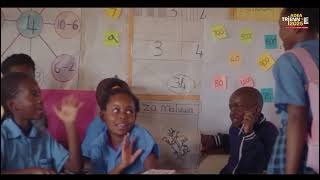Sub-Theme 1
Reimagining Financing for Education in Africa, Including Implications Due to Shifts in the Global Funding Landscape
African countries spent on average, 4.6% of their GDP on public education in 2019 according to GEMR and ADEA (2022). This is just meeting global benchmark of 4–6% of GDP or 15–20% of total public expenditure. Primary education has the largest share at 2% of GDP and 44% of total education spending and secondary education at 1.5% and 34% respectively. The World Bank (2022) estimates that tertiary education accounts for 1.1% of GDP and 22.6% of total public spending on education, with high per-student costs. Investment in pre-primary education is extremely low, averaging only 0.1% of GDP. Many African countries spend less than 2% of education budgets on ECE (UNICEF, 2021). There is also the issue of allocation compared to disbursements, with the latter depicting the reality.
Actionable and strategic ideas to help African countries go beyond the bare minimum in financing education includes having a better link of education financing to economic growth – making the argument for increased spending on education more ‘economic’ than social, a strategic investment in Africa’s demographic advantage (the youth). It also means increasing domestic resource mobilization through progressive tax reforms, aggressively combating Illicit financial flows, improving efficiency and accountability, broadening the tax base by, for example, digitizing tax collection systems, and looking at natural resource revenue allocation. Strengthening regional collaboration, intentionally engaging the private sector and philanthropy, and embracing data-driven financing are also key.
Africa must also rethink its stand on leveraging external financing. Recent reductions in Official Development Assistance (ODA) for education and skills development across Africa have had profound and multifaceted impacts. These cuts are exacerbating existing challenges in access, equity, and learning quality, and they threaten long-term socio-economic progress on the continent.
The United States government's decision to end funding for a wide range of USAID-supported programs – including those in health, education, and skills development – has thrown many initiatives into uncertainty. This move has had a ripple effect across sectors and countries, creating an unprecedented situation for education and skills development in Africa. However, trends in ODA suggest that such a shift was increasingly likely. A recent World Bank blog, curated by the Global Education Monitoring (GEM) Report, highlights the chronic challenge of meeting the longstanding UN target for ODA – 0.7% of gross national income (GNI). As of five years ago, only six of the 30 members of the OECD Development Assistance Committee (Denmark, Germany, Luxembourg, Norway, Sweden, and the United Kingdom) met this target. Today, average ODA spending among OECD donors remains stagnant at around 0.35% of GNI, with further reductions on the horizon.
According to a 2025 report by the European Training Foundation, USAID disruptions have affected education and skills development programs in 58 countries. Of the 396 education-specific programs impacted, more than one-third were in sub-Saharan Africa (153 programs), with another 72 in North Africa and the Middle East. Vulnerable groups – including girls, refugees, and marginalized communities – are likely to suffer the most in the short term. Long-term consequences may include regression on SDG 4 and continental education frameworks such as CESA and the Continental TVET Strategy. These setbacks could lead to higher dropout rates, wider gender gaps, rising youth unemployment, and workforce unpreparedness, potentially fueling economic instability and geopolitical shifts.
The GEM Report (2025) notes that while the U.S. action is particularly abrupt, it mirrors broader trends among other donor countries. The UK, for instance, reduced its ODA from 0.7% to 0.5% of GNI in 2021, with further cuts to 0.3% by 2027. The Netherlands plans to reduce its ODA from 0.62% in 2024 to 0.44% in 2029. Belgium will slash aid by 25% over five years, and Switzerland is cutting $363 million from its 2026–28 bilateral and multilateral development cooperation budget, including for education. These cuts have tangible consequences: aid to education in Chad and Liberia is expected to be halved, while Madagascar and Mali will see a one-third reduction. Ethiopia, Rwanda, and the DRC are facing aid reductions of $33 million, $35 million, and $51 million respectively. In total, education spending in Liberia and Somalia is expected to fall by 23% and 45%, respectively.
Africa’s Response: A Resilience Imperative
This crisis was foreshadowed in the aftermath of the COVID-19 pandemic, which exposed deep vulnerabilities in Africa’s education systems. One of the key takeaways was the urgent need for early warning systems and long-term resilience strategies in education planning.
There are now encouraging signs of a shift in the global partner ecosystem. The Gates Foundation has been working with ADEA and the Human Capital Africa (HCA) to engage policymakers on reimagining education financing for foundational learning. During the 6th meeting of the African Foundational Learning Ministerial Forum, member states shared perspectives and emerging initiatives designed to respond to the new funding landscape. Ministers collectively agreed on the need for a government-led initiative that places African countries at the forefront of efforts to deliver on national and continental education commitments – including the goal of ending learning poverty by 2035.
Concurrently, the African Development Bank (AfDB) has been exploring how innovations such as AI can be used for domestic resource mobilization. This includes leveraging digital platforms and data systems to improve tax collection, broaden the revenue base, and prioritize investment in key social sectors. Additional discussions have focused on and innovative financing mechanisms with public-private partnerships at country level, as part of leveraging private philanthropy.
The discussions under this sub-theme at the ADEA 2025 Triennale provide a watershed moment for African education policymakers. This is a pivotal opportunity to make bold, strategic moves toward sustainable, self-reliant education financing – and it is one that Africa should not miss.

